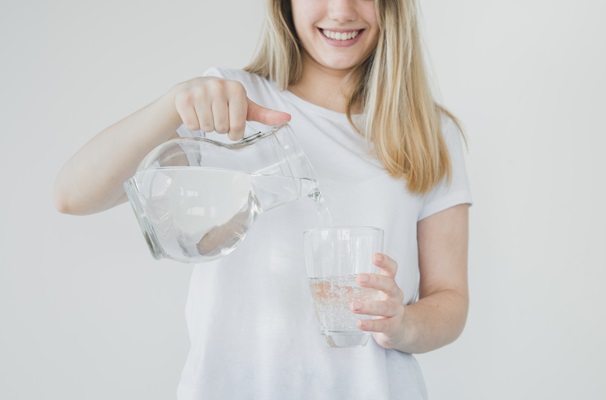In the grand tapestry of human existence, one element reigns supreme – water. It’s the elixir of life, the driving force behind every metabolic process, the very essence of health and vitality. This comprehensive guide is your passport to the world of hydration, where we’ll delve deep into the importance, science, and art of nourishing your body with water.

Introduction
The Vital Role of Hydration for Health
Water isn’t just a beverage; it’s a life force. Every living organism, including humans, depends on water for survival. It’s the foundation of life itself, constituting over 60% of the adult human body. Water keeps our cells, tissues, and organs working harmoniously. It’s the coolant for our body’s engine, ensuring optimal performance.
But hydration goes beyond simple survival. It’s the key to thriving. Proper hydration can improve physical performance, cognitive function, and even your skin’s health. This article is your guide to mastering the art of hydration and unlocking its potential.
Why Water is Essential for Your Well-being
Water, the universal solvent, is a magician when it comes to health. It serves as a medium for countless biochemical reactions, transporting nutrients, regulating temperature, and aiding digestion. Yet, what makes it truly remarkable is its versatility – you can drink it, cook with it, and even absorb it through fruits and vegetables.
Beyond the physiological aspects, staying well-hydrated brings a cornucopia of benefits. From improved mood and cognition to glowing skin and better athletic performance, the benefits of water are innumerable. It’s not just about thirst; it’s about giving your body what it craves to function at its prime.
Understanding Hydration
Defining Hydration
Hydration is more than just drinking water; it’s about maintaining the body’s fluid balance. When you’re hydrated, your body has the right amount of fluid it needs to function optimally. Dehydration, on the other hand, means your body doesn’t have enough water to carry out its usual processes.
Understanding hydration for health involves knowing the importance of water in various bodily functions, from carrying nutrients to the cells to regulating body temperature. It’s a dynamic equilibrium that your body strives to maintain.
Dehydration and Its Consequences
Dehydration is your body’s cry for help, signaling that something is amiss. The consequences can be mild, leading to symptoms like headaches, dry skin, or fatigue, or severe, culminating in life-threatening conditions such as heatstroke or kidney failure.
As we journey through this article, you’ll learn to recognize the signs of dehydration and understand why it’s essential to combat it. Stay tuned for strategies to stay adequately hydrated, whatever your lifestyle may be.
The Human Body’s Water Composition
To appreciate the importance of hydration for health, you must first grasp the body’s water composition. Our bodies are essentially waterlogged. From cells to organs, every bit of us depends on water.
Your body uses this water for various functions, such as maintaining blood volume, transporting nutrients, and removing waste products. Different tissues contain varying amounts of water, and knowing this can help you understand why hydration for health is crucial.
Daily Hydration Needs
Factors Influencing Hydration Requirements
Hydration for health is not one-size-fits-all. Your daily water needs depend on numerous factors, including your age, gender, activity level, and environmental conditions. For instance, a highly active athlete in a hot climate will require significantly more water than a sedentary individual in a cool environment.
This section will unravel these factors, empowering you to tailor your hydration to your unique lifestyle and circumstances.
Tailoring Hydration to Your Lifestyle
As your daily activities change, so do your hydration needs. Whether you’re a desk-bound professional, a fitness enthusiast, or a busy parent, there’s a hydration plan tailored to your life. This section will guide you on how to adapt your water intake to suit your lifestyle and thrive.
The 8×8 Rule – Myth or Must?
You might have heard of the “8×8” rule, suggesting eight 8-ounce glasses of water a day. But is this a universal standard or a myth that needs debunking? We’ll examine this guideline and provide clarity on whether it’s an appropriate rule of thumb.
Benefits of Staying Hydrated
Enhancing Cognitive Function
Your brain, like the rest of your body, is heavily reliant on water. When you’re properly hydrated, your cognitive function is at its peak. You can think more clearly, concentrate better, and even maintain a more stable mood. We’ll dive into the science behind this mental boost and offer tips to keep your brain hydrated for peak performance.
Boosting Physical Performance
For athletes and exercise enthusiasts, proper hydration for health can make or break performance. Dehydration can lead to muscle cramps, decreased endurance, and reduced strength. In this section, we’ll explore how maintaining optimal hydration levels can help you achieve your fitness goals.
Supporting Digestive Health
Hydration for health plays a vital role in maintaining digestive health. Water is essential for breaking down food, absorbing nutrients, and preventing constipation. We’ll uncover the connection between hydration and digestive well-being, offering insights into how to keep your gut happy.
Skin and Hydration
Your skin, the body’s largest organ, reflects your inner health. Proper hydration can result in smoother, more radiant skin. We’ll explore how hydration impacts your skin’s elasticity, clarity, and overall appearance, and provide tips for maintaining a youthful complexion.

Signs of Dehydration
Recognizing Mild vs. Severe Dehydration
Dehydration comes in different degrees, from mild to severe. Recognizing the signs can be a lifesaver. Learn to differentiate between mild symptoms like dark urine or dry mouth and severe indicators, such as extreme thirst, dizziness, or confusion.
Monitoring Urine Color and Frequency
One of the most accessible ways to monitor your hydration status is by observing your urine. Its color and frequency can provide valuable insights into your body’s water balance. We’ll decipher the language of urine and help you make informed decisions about your hydration.
Dry Mouth and Thirst: The Body’s Alarms
Dry mouth and thirst are like your body’s smoke alarms, signaling that something is amiss. They’re early warning signs of dehydration. Understanding why they occur and how to respond is crucial to maintaining optimal hydration.
Optimal Water Sources
Tap Water vs. Bottled Water
The choice between tap water and bottled water isn’t always straightforward. We’ll compare the pros and cons of each, considering factors like cost, convenience, taste, and environmental impact.
The Magic of Natural Spring Water
Natural spring water is more than just a beverage; it’s a source of minerals and unique flavors. Dive into the world of natural spring water, exploring its purity and potential health benefits.
Infused Water: A Flavorful Twist
If plain water doesn’t excite your taste buds, infused water can be a refreshing alternative. Learn how to infuse your water with fruits, herbs, and spices to enhance both flavor and nutrition.
Electrolytes and Hydration
Role of Electrolytes in Hydration
Electrolytes are essential minerals that help regulate the body’s fluid balance. We’ll explore their critical role in maintaining hydration for health, and how an imbalance can lead to issues like muscle cramps or weakness.
Electrolyte-rich Foods and Drinks
You don’t always need sports drinks to replenish electrolytes. Many foods and natural beverages are rich sources. Discover everyday foods that can help maintain your electrolyte balance.
Homemade Electrolyte Solutions
Homemade electrolyte solutions are a healthier alternative to store-bought sports drinks. In this section, we’ll provide recipes and guidelines for creating your own electrolyte solutions.
Hydration and Exercise
Pre-Workout Hydration Strategies
Before embarking on your exercise journey, it’s essential to prepare your body by hydrating properly. Discover strategies for pre-workout hydration, including timing and fluid choices.
Hydrating During Exercise
While you exercise, your body sweats to stay cool, leading to fluid loss. We’ll guide you on how to maintain optimal hydration levels during your workout, ensuring you can perform at your best.
Post-Exercise Rehydration
After the workout, it’s time to replenish what you’ve lost. We’ll discuss the importance of post-exercise rehydration and strategies to aid in recovery.

Special Considerations
Hydration for Children and the Elderly
Different life stages have unique hydration needs. Children and the elderly, in particular, require special consideration. We’ll delve into these needs, offering tips to ensure their well-being.
Pregnancy and Hydration
Pregnancy places extra demands on the body, including increased hydration needs. We’ll explore the crucial role of hydration during pregnancy and its impact on both mother and baby.
Hydration and Medical Conditions
Certain medical conditions can affect your hydration status. This section will elucidate how conditions like diabetes or kidney disease can influence your hydration needs and provide strategies for managing them.
Overhydration: Is it Possible?
The Dangers of Drinking Too Much Water
While dehydration is a concern, overhydration is also a risk. We’ll discuss the dangers of excessive water intake, known as water intoxication or hyponatremia.
Finding the Right Balance
Strike a balance between hydration and overhydration. Discover how to maintain optimal fluid levels without going to extremes.
Water Quality and Purity
Understanding Water Contaminants
Water isn’t always pristine. It can contain contaminants that affect both its taste and safety. We’ll identify common water pollutants and their potential health implications.
Water Filtration and Purification Methods
To ensure the water you consume is safe, you may need to employ filtration and purification methods. We’ll explore different methods and their effectiveness in removing contaminants.
Bottled Water Label Insights
Not all bottled water is created equal. We’ll help you decipher the labels, so you can make informed choices about the water you purchase.
Sustainable Hydration Practices
Reducing Plastic Waste
Plastic pollution is a global concern. We’ll discuss how you can contribute to a greener planet by reducing plastic waste associated with bottled water.
Sustainable Water Sources
Sustainability in water sources is not just about quantity but also quality. Discover sustainable water sources and ethical water consumption practices.
The Importance of Responsible Water Consumption
Responsible water consumption benefits both you and the planet. We’ll delve into the importance of consuming water mindfully and responsibly.
Tips for Staying Hydrated
Developing a Hydration Routine
Creating a personalized hydration routine is the key to ensuring you meet your daily water intake goals. Learn how to build a routine that works for you.
Setting Reminders and Goals
Stay on track with your hydration goals by setting reminders and milestones. We’ll guide you on how to stay committed to your water intake targets.
Creative Ways to Increase Water Intake
Drinking enough water doesn’t have to be a chore. Explore innovative ways to make staying hydrated enjoyable and a part of your daily routine.
Conclusion
The Power of Hydration in Health
As we wrap up this comprehensive exploration of hydration for health, take a moment to reflect on the profound impact it has on your overall health. From the tips for staying hydrated to understanding water quality, this guide has equipped you to master the art of hydration.
Committing to a Well-Hydrated Life
Now that you’ve acquired the knowledge and strategies, commit to prioritizing proper hydration for health as a cornerstone of a healthy, fulfilling life. A well-hydrated life is within your reach, and it’s time to seize it.





